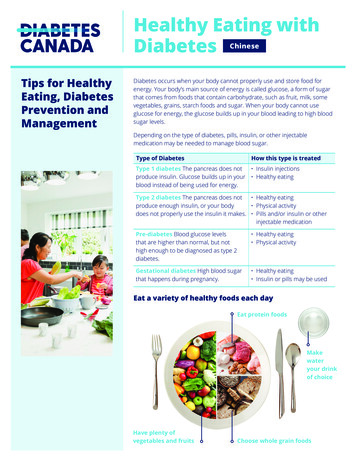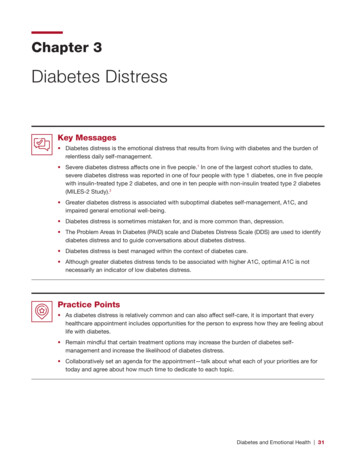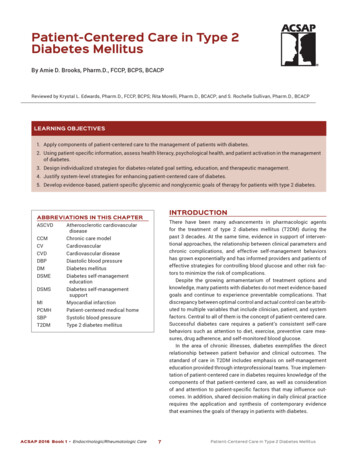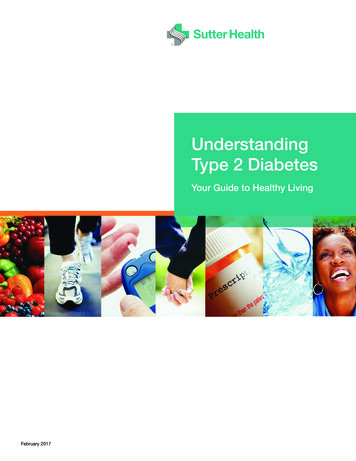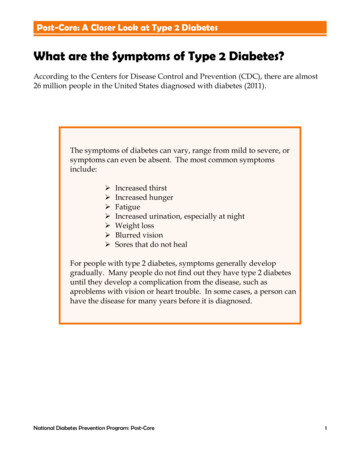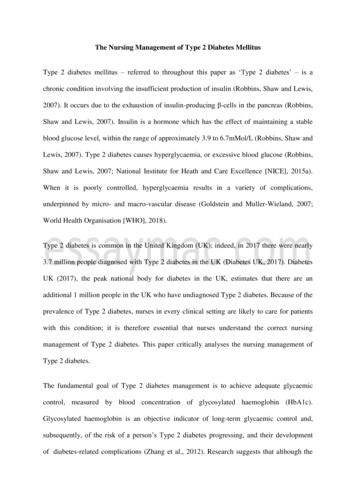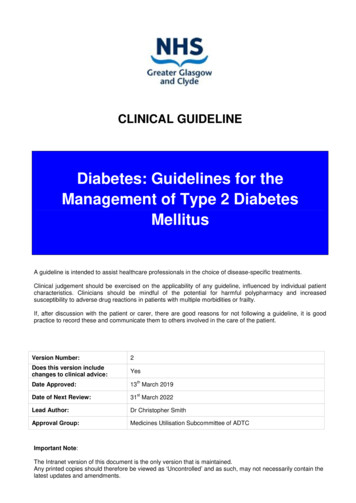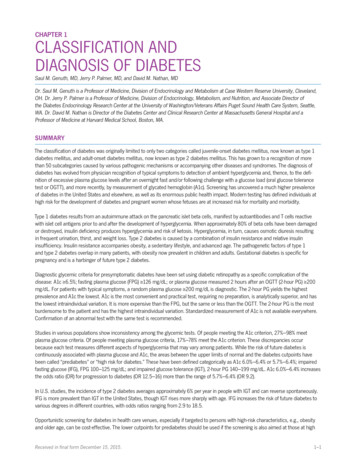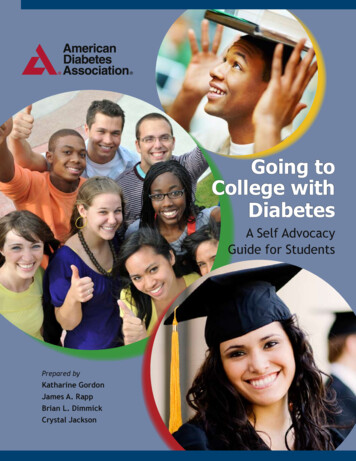
Transcription
Going toCollege withDiabetesA Self AdvocacyGuide for StudentsPrepared byKatharine GordonJames A. RappBrian L. DimmickCrystal Jackson
Going to College with Diabetes:A Self Advocacy Guide for StudentsPrepared ByKatharine GordonADA - Novo Nordisk Staff AttorneyAmerican Diabetes AssociationJames A. RappAttorney, Hutmacher & Rapp, P.C.Quincy, IllinoisBrian L. DimmickAssociate Director and Staff Attorney, Legal AdvocacyAmerican Diabetes AssociationCrystal JacksonAssociate Director, Legal AdvocacyAmerican Diabetes Association
First Edition April 2011
2011 American Diabetes Association.User is hereby granted permission to copy or disseminate this publication, either in print orelectronic format, provided such copies are not made, distributed or used for commercialpurposes, affix the American Diabetes Association's copyright notice, and state that copying isby permission of the American Diabetes Association. To disseminate otherwise, or to republishrequires written permission from the American Diabetes Association. Permission can beobtained by contacting the Association’s Government Affairs and Advocacy Department, at 1703-549-1500.This publication is designed to provide accurate and authoritative information in regard to thesubject matter covered. It is provided with the understanding that the publisher is not engaged inrendering legal, accounting, or other professional services. If legal advice or other expertassistance is required, the services of a competent professional should be sought.
Table of ContentsAcknowledgements . IVAbout the Authors . VGlossary of Common Terms . VI1.What Is This Guide? . 11.11.21.31.41.51.62.Can attorneys and other advocates use this guide? . 1Why does this guide use the term “disability” to refer to diabetes? . 1How is this guide organized? . 2What topics does this guide cover? . 2How does the American Diabetes Association assist students with diabetes? . 3How should the legal references in the notes be used? . 4What Are My Legal Rights as a College Student with Diabetes? . 62.1 What federal disability laws protect college students with diabetes? . 62.2 Am I covered by the ADA and Section 504? . 62.3 What are some of the general differences between the obligations of K-12 schools andcolleges? . 62.4 Because I successfully manage my diabetes with insulin, does that mean that I do nothave a “disability” under the ADA and Section 504? . 72.5 Am I eligible for services under the Individuals with Disabilities Education Act? . 72.6 Am I protected against discrimination if I go to a religious college? . 82.7 Do I need to meet my college’s general eligibility requirements and admissionsstandards? . 82.8 Does my college have to modify its programs for me because of my diabetes? . 82.9 Can I be excluded from a program because my college does not think I will be able tofind a job in the field upon graduation because of my diabetes? . 92.10 Does my college have a policy prohibiting discrimination on the basis of disability? .102.11 Am I protected against retaliation and harassment if I request modifications or I raiseconcerns about discrimination? .102.12 Can my college assist organizations that discriminate against people with diabetes?.102.13 What are my protections at military educational institutions and in programs like theReserve Officer Training Corps (ROTC)? .11Notes to Chapter 2 .123.What Are My Rights in the Admissions Process? .183.1 Can a college ask me about diabetes during the admission process? .183.2 What are the advantages and disadvantages of voluntarily disclosing my diabetes priorto an admissions decision?.183.3 Can my high school disclose my diabetes to the colleges to which I am applying? .193.4 If I do not let colleges know about my diabetes when I am applying for admission, howcan I ensure that my needs will be met when I start school? .193.5 Can my college ask about disabilities after I have been admitted but prior tomatriculation? .193.6 Should I disclose my diabetes after admission? .19Notes to Chapter 3 .21i
4.How Can I Work with my Disability Services Office? .224.1 Who should I first approach for assistance? .224.2 When should I contact my disability services office?.224.3 Can I still get modifications if I miss a deadline to register for disability services? .234.4 What documentation should I provide to my college in order to receive modifications? .234.5 How should my college decide what modifications are appropriate? .234.6 How do colleges typically implement accommodations? .244.7 Does my college need to provide me with a written Section 504 Plan?.244.8 Should I request modifications directly from my professors? .244.9 Does my college have to give me the same modifications I received in high school? .254.10 If I did not get modifications in high school, can I get them in college? .254.11 Should my parents request modifications on my behalf? .254.12 What rules apply to the release or exchange of medical and educational information?.264.13 How can I make sure that my family can communicate with my college in case of anemergency?.26Notes to Chapter 4 .275.What Academic Modifications Might I Expect? .295.1 Can I reschedule my exams if my blood glucose level is out of target range?.295.2 Can I be prohibited from keeping my diabetes supplies with me or engaging in self-care,including testing my blood glucose, injecting insulin, and eating? .305.3 Am I entitled to breaks during exams to take care of my diabetes? .305.4 Am I entitled to extra time to complete exams? .315.5 What should I do on exam day if problems arise? .315.6 Can I miss class due to my diabetes?.325.7 Can I be sanctioned for poor academic performance, even though my diabetes impactedmy performance? .335.8 Can I get my grades changed if I did poorly due to undiagnosed diabetes? .335.9 Can I withdraw from a course or take a leave of absence due to diabetes?.33Notes to Chapter 5 .346.What Modifications Are Available for Other Programs and Services (Housing, MealPlan, Health Clinic, Athletics, Etc.)?.366.1 Does my college need to provide me with health care for my diabetes? .366.2 Can I require my college to train individuals to administer glucagon or to make otherprovisions for emergency medical treatment?.366.3 How can I make sure my health care needs are met? .366.4 Can I get modifications in campus housing? .386.5 Can I join a fraternity or sorority? .386.6 Do I need modifications to the campus meal plan? .396.7 Can I play intercollegiate sports? .396.8 Can I participate in study-abroad programs? .40Notes to Chapter 6 .417.What Can I Expect in Internships, Clinics, and Work? .427.17.27.37.4What are some examples of discrimination student workers with diabetes may face? .42What rights do I have in clinical programs and internships?.42What rights do I have as an employee of my college? .43What rights do I have in off-campus jobs or in jobs I take after graduation? .43ii
7.5 What types of modifications and accommodations might I be entitled to?.447.6 What if my internship or job supervisor is afraid I cannot work safely?.44Notes to Chapter 7 .458.How Are Disagreements Resolved?.478.18.28.38.48.5How are anti-discrimination laws enforced? .47What grievance procedures may be available at my college?.47Which federal agencies investigate disability law complaints involving colleges? .47How is a federal complaint filed? .48When should litigation be considered? .48Notes to Chapter 8 .499.How Can I Get the Modifications I Need on Standardized Tests and LicensingExams? .509.19.29.39.49.59.69.7What laws protect test takers? .50Will score reports indicate that I used modifications?.50What types of modifications should be requested? .51When should I ask for modifications? .51What documentation should I provide in order to receive modifications? .52What should I do on exam day? .52Must I have received modifications in school in order to receive modification onstandardized tests and licensing exams? .539.8 How are disputes resolved? .539.9 What are some of the major standardized tests and licensing exams and where can Ifind their procedures? .53Notes to Chapter 9 .55Appendix .56Sample Request for Accommodations Letter .56Sample Medical Documentation for Type 1 Diabetes .57Sample Medical Documentation for Type 2 Diabetes .58Sample Accommodations Letter from College.59Diabetes Basics for Students and Postsecondary Institution Officials.60Special Concerns about the Use of Alcohol.63Postsecondary Resources List .64iii
AcknowledgementsThis guide would not have been possible without the generous contributions of numerousindividuals. In particular, the authors wish to thank Sarah Blenner, Robert Ennesser, ProfessorEdward Kraus, Sara Mahoney, and Kelsey Stefanik-Sidener for their valuable assistance inreviewing drafts of this notebook. The authors also want to acknowledge the many students andvolunteer advocates who work tirelessly for fair treatment. Without them, students with diabeteswould not enjoy the protections afforded them under the law.iv
About the AuthorsKatharine Gordon is an ADA - Novo Nordisk Staff Attorney at the American DiabetesAssociation. She focuses on providing direct assistance and referrals to students, workers,parents, and prisoners discriminated against because of their diabetes. A former GeorgetownUniversity Women’s Law and Public Policy Fellow, she is a graduate of Bryn Mawr College andthe George Washington University Law School.James A. Rapp is one of the United States' foremost authors in the area of law and education.His works include a seven-volume treatise, Education Law, published by Lexis/Nexis (MatthewBender & Co.), as well as numerous publications on subjects ranging from school crime andviolence, record sharing, victims' litigation, medical malpractice, and tax law. As the father ofthree daughters, Jim takes a personal interest in education. He is a strong advocate of safeschools, effective discipline, agency cooperation, the critical role of parents in their children'seducation, and the rights of students with disabilities. Bridging the chasm between scholarlytheory and real-world application, he is an attorney with a private general practice in theMidwest town of Quincy, Illinois. Jim serves on the American Diabetes Association LegalAdvocacy Subcommittee and Safe at School Task Force. He is a graduate of the University ofIllinois and Washington University School of Law.Brian L. Dimmick is an Associate Director and Staff Attorney at the American DiabetesAssociation. In this position, he focuses on the Association’s efforts to provide assistance toattorneys working to protect the rights of people with diabetes and to end discrimination inemployment, education, correctional institutions and other areas. He previously worked as aSkadden Fellow and attorney with Disability Rights Advocates, a non-profit law firm in Oakland,California dedicated to protecting and advancing the rights of people with disabilities. He is agraduate of Wake Forest University and Stanford Law School.Crystal Jackson is an Associate Director of Legal Advocacy at the American DiabetesAssociation, where her primary responsibility is managing the Association’s Safe at SchoolCampaign. Crystal, a former litigation paralegal, is a parent of a child with diabetes and a longtime ADA volunteer who joined the legal advocacy staff in 1999 after she successfully lobbiedthe Virginia General Assembly for passage of school diabetes care legislation that has resultedin improved standards of care for students with diabetes. Advocating on behalf of her daughter,Crystal achieved a model OCR resolution agreement for the care of students with diabetes inthe Loudoun County (VA) School District. Crystal has contributed to many diabetes publicationsincluding the National Diabetes Education Program’s Helping the Student with DiabetesSucceed: A Guide for School Personnel and is a frequent guest speaker at diabetesconferences and camps. Crystal is a member of the Virginia Diabetes Council, the U.S. DAWNYouth Advisory Board, and serves on a number of diabetes and youth panels.v
Glossary of Common TermsAccommodations: A term often used to refer to changes that allow college students toparticipate equally in educational programs. The term “accommodations” is more appropriatelyused in the employment context, while “modifications,” “adjustments,” and “auxiliary services”are the appropriate terms in the education context. While this guide follows the technical terms,the term “accommodations” has become common shorthand in the postsecondary setting.Americans with Disabilities Act (ADA): A federal law enacted in 1990 that prohibitsdiscrimination against people with disabilities. As it relates to state-run colleges, therequirements of the ADA are almost identical to those of Section 504 of the Rehabilitation Act.The education provisions of the ADA apply to all state-run and private colleges except thosecontrolled by religious organizations. The employment provisions apply to employers with 15 ormore employees, including those controlled by religious organizations.College: For convenience, the shorthand terms “college” and “college students” are usedthroughout this guide to refer to all postsecondary institutions, programs, and students.Department of Justice (DOJ): The Department of Justice enforces Title II and Title III of theADA through investigating complaints and bringing litigation against entities that violate theseparts of the law. By agreement with DOJ, OCR enforces Title II of the ADA as it applies toeducational institutions.Disability: Under the ADA and Section 504, a disability is defined as an impairment thatsubstantially limits one or more major life activities. Amendments to the definition of disabilityunder both laws, effective January 1, 2009, have made it clear that virtually all, if not all,students and employees with diabetes will meet this definition, and thus, are protected fromdiscrimination.Disability Services Office: An office which most postsecondary institutions have, sometimeswith a different name, that coordinates assistance for students with disabilities. This office isoften the first point of contact for students with concerns relating to their diabetes.Equal Employment Opportunity Commission (EEOC): A federal agency that investigatescomplaints of discrimination under the ADA by employees and applicants for jobs.Modifications: Changes made to educational programs that permit postsecondary students toparticipate on an equal basis. “Adjustments” and “auxiliary aids” are also appropriate terms torefer to these changes.Office for Civil Rights (OCR): An agency within the U.S. Department of Education responsiblefor enforcing Section 504 and, by agreement with the DOJ, Title II of the ADA, as they apply toeducational institutions. OCR’s duties include investigating complaints and conductingcompliance reviews.Reasonable Accommodations: Changes to a job or work environment that enable qualifiedapplicants or employees with disabilities to participate in the application process or to performessential job functions. Reasonable accommodations also include changes to ensure thatqualified individuals with disabilities have rights and privileges in employment equal to those ofemployees without disabilities.Section 504: The section of the Rehabilitation Act (a federal law passed by Congress in 1973)that prohibits federal agencies and programs and recipients of federal funds from discriminatingagainst individuals on the basis of disability. Section 504 requires that postsecondary institutionsensure that qualified students and employees are not discriminated against on this basis.vi
1. What Is This Guide?This is an authoritative and comprehensive guide on the rights of peoplewith diabetes in college and a wide range of other postsecondaryinstitutions. It is designed primarily to provide strategies for you, thestudent, to work with your college, testing agency, internship site,employer, and others to ensure that your diabetes does not prevent youfrom having an equal opportunity to participate and succeed. Whetheryou are an applicant or currently enrolled, this guide can help younavigate a wide range of postsecondary institutions.This guide provides useful self-advocacy tools including: Information about your legal rights and your college’s legalobligations; Strategies for working with your college to get reasonablemodifications and accommodations such as permission to rescheduleexams, eat food in class, or have breaks in your on-campus job; and Practical tips to help you manage your diabetes in a new environment.The purpose of this guide is not to steer you towards litigation. Rather,when you learn what your rights are and how to advocate for them, youwill be empowered to create a positive working relationship with yourcollege. To this end, we provide resources that you can use during theprocess of working with college personnel, including sample forms.1.1Can attorneys and other advocates use this guide?Yes, this guide also provides detailed information that can be used by attorneys andnon-attorney advocates on the legal rights of college students with diabetes and howthose rights can be enforced. As discussed in Question 1.6, the guide contains manyreferences to statutes, court opinions and administrative agency letters of finding. Thesematerials should be helpful to advocates without legal training (including students andtheir parents); however, students and advocates should understand that that this guidedoes not provide legal advice, and cannot substitute for the advice of a licensedattorney in situations where legal advice is needed.1.2Why does this guide use the term “disability” to refer to diabetes?Many people with diabetes do not view the condition as a disability, just a medicalcondition that must be managed every day. However, sometimes you may be treatedunfairly because of your medical diagnosis. If this occurs, using the legal term1
“disability” can protect you from being harmed by the ignorance and fear of others soyou can be judged on your accomplishments and your abilities.1.3How is this guide organized?While it may be useful to read this guide in its entirety, we have organized it intoseparate chapters that can be read independently. For example, you may just have aquestion about standardized testing – thus, you may rely exclusively on Chapter 9 for allthe relevant information. Each chapter deals with a different topic, including admissions,academic modifications, non-academic modifications, and standardized testing. Wehave used a concise question and answer format with the goal of making theinformation more accessible and practical.Most chapters are followed by a section of “Notes” which provide more detailedinformation on certain questions. Where there is a note provided for a particularquestion and answer, this is indicated by a superscript annotation. While this guide isdesigned so that it can be successfully used without consulting these notes, we providethem in case you would like to explore an issue in more depth. Also, as explained inQuestion 1.1, these notes will be especially valuable to attorneys and non-attorneyadvocates. Question 1.6 explains how to interpret the legal references contained inthese notes.In the Appendix, we have included sample forms so you can get a sense of the types ofdocuments you might use if you request modifications from your college. We have alsoincluded a basic description of the science of diabetes that you can share withprofessors and administration officials who may not be familiar with the condition.1.4What topics does this guide cover? What Is This Guide? Chapter 1 (this section) describes this guide and itsorganization. What Are My Legal Rights as a College Student with Diabetes? Chapter 2 discussesthe legal rights of college students with diabetes as well as the anti-discriminationobligations of colleges. It introduces the two main federal laws that protect you as astudent with diabetes: the Americans with Disabilities Act (ADA) and Section 504 ofthe Rehabilitation Act of 1973(Section 504). This section discusses which individualsand which schools are covered by each law. What Are My Rights in the Admissions Process? Chapter 3 discusses theadmissions process. Are colleges allowed to ask about diabetes? What are the prosand cons of revealing that you have diabetes in your application? These and otherissues are addressed. How Can I Work with My College Disability Services Office? Chapter 4 discusseshow you can work with your college’s disability services office to get themodifications that you may need to be successful in college. What Academic Modifications Might I Expect? Chapter 5 describes some typicalacademic modifications that you might request. Colleges do not have to provide all2
of the academic modifications that elementary and secondary schools do, and thetypes of modifications will be quite different. This section explains in detail many ofthe specific academic modifications you may consider requesting, including changesto exam scheduling, breaks during exams, and attendance policies. What Modifications Are Available for Other Programs and Services? Do you playsports and want to make sure your coach is aware of the possibility ofhypoglycemia? Do you need nutritional information for cafeteria food? Chapter 6discusses modifications outside of the academic context. These areas includehousing, fraternities and sororities, meal plans, health clinics, athletics, andinternational study. What Can I Expect in Internships, Clinics, and Work? Chapter 7 discusses issuesrelating to clinics, internships, and employment. A large proportion of collegestudents work, either for pay or as part of an educational program. As a person withdiabetes, you are protected against discrimination in these settings and your collegemay have responsibility for ensuring that discrimination does not occur. This chapterprovides an introduction to these protections. How Are Disagreements Resolved? Chapter 8 addresses the procedures to befollowed when disputes cannot be resolved informally. This section coversprocedures under the ADA and Section 504, including complaint procedures,deadlines, and prerequisites to litigation. How Can I Get the Modifications I Need on Standardized Tests and LicensingExams? Chapter 9 provides information about requesting modifications onstandardized tests such as the SAT and GRE, and licensing exams such as medicalboards and bar exams.1.5How does the American Diabetes Association assist students withdiabetes?Founded in 1940, the American Diabetes Association is the nation’s premier nonprofitvoluntary health organization. The Association’s mission is to prevent and cure diabetesand to improve the lives of all people affected by diabetes through diabetes research,information, education, and advocacy. While maintaining our leadership in research andeducation, in recent years we have also become very active in working to eliminatediscrimination against people with diabetes through the use of education andnegotiation, federal and state litigation, legislation, and regulatory reform.Here are some of the resources the Association offers to fight discrimination: We provide extensive self-advocacy material for individuals with diabetes(www.diabetes.org/discrimination). By calling 1-800-DIABETES, individuals who believe they have experienceddiabetes discrimination can request to speak with one of our legal advocates. Whileunable to represent individuals, our legal advocates (who are licensed attorneys)provide information about legal rights, provide self-advocacy and negotiation tools,3
and, where necessary and appropriate, guide callers through the applicable legalprocess ights/how-to-get-help). We prov
4.7 Does my college need to provide me with a written Section 504 Plan?.24 4.8 Should I request modifications directly from my professors? .24 4.9 Does my college have to give me the same modifications I received in high school? .25 4.10 If I did not get modifications in high school, can I .

